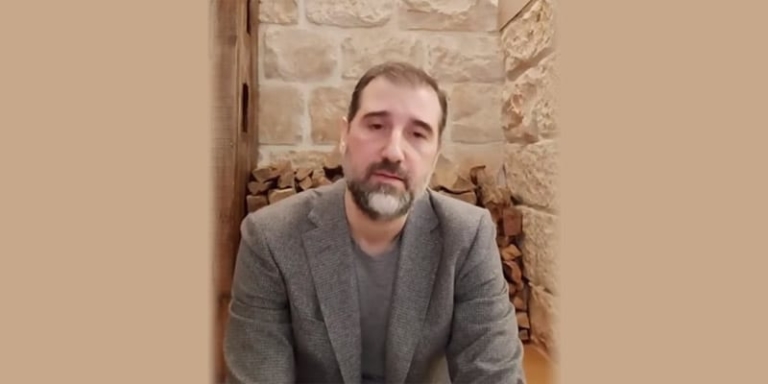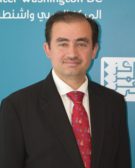
Much rumor, analysis, and speculation have appeared over the last few weeks about a rift in the Assad-Makhlouf political and economic alliance governing Syria today. Rami Makhlouf, Syrian President Bashar al-Assad’s maternal cousin and reputedly Syria’s richest man, published two videos on his Facebook account in which he complained about security services raids on his offices and appealed to the president to end the practices. Such a public spat puts the Syrian regime in a difficult position while it is trying to defeat the opposition, break its regional and international isolation, and organize a massive reconstruction project for the country following close to ten years of civil war.
The Rami Makhlouf Empire: A Brief Primer
When Bashar al-Assad became president of Syria in 2000 following the death of his father, Hafez, he initiated a series of partial economic reforms to allow the private sector to play a role in banking, insurance, and education—all controlled by the public sector at that time. His initial steps were generally welcomed by Syrian businessmen and the larger society because they promised to improve the country’s economic conditions. But it soon became apparent that Assad’s cousin, Rami Makhlouf, emerged as the main beneficiary of the reforms when he established private banks and insurance companies and later branched out into the telecommunications sector. He also got involved in real estate and purchased large tracts of land for residential and commercial use. He followed his father Mohammed’s footsteps into the oil sector via the GULFSANDS Petroleum company and controlled cross-border trade with Iraq, Turkey, Jordan, and Lebanon through his company, Ramak. Many of these businesses, and Rami Makhlouf himself, are under US sanctions.
The monopoly of the telephone business by Makhlouf came at the expense of the Syrian treasury, prompting objections and calls for an investigation by independent parliamentarian Riad Seif, who was later arrested
However, Makhlouf’s prized business holding was in cellular telephone services. In the early 2000s he established Syriatel with the assistance of Egyptian mogul Naguib Sawiris. He had no prior experience in or knowledge of the telecommunications industry and Sawiris––owner of giant Orascom Telecom––provided the necessary technical and financial assistance. But shortly after striking the deal, Makhlouf began efforts to break the relationship and eventually succeeded. The monopoly of the telephone business by Makhlouf came at the expense of the Syrian treasury, prompting objections and calls for an investigation by independent parliamentarian Riad Seif, who was later arrested (incidentally, as Assad’s so-called Damascus Spring was in full swing in 2000-2001). In real estate, Makhlouf established Cham Holding to benefit from government decrees allowing for the creation of free economic zones around the capital, Damascus.
Makhlouf became the face of corruption in Syria and was attacked by protesters at the start of Syria’s civil war in March 2011. He stepped aside from his businesses a few months into the uprising, ostensibly to devote his time to charity. Still, his resignation was seen as a necessary sacrifice by the president, who needed a gesture to mollify the opposition and public demonstrations. It was also speculated that Makhlouf fell out of favor with Assad when he declared in an interview that the international community must choose between the regime’s survival or chaos that will affect Israel. It is also known that Makhlouf used his money to finance sectarian militias loyal to the regime, which earned him support within the regime and his Alawi community.
Managing Family Disputes
Rami Makhlouf’s ongoing spat with his cousin Bashar al-Assad is a throwback to another conflict that festered in the 1980s between the late President Hafez al-Assad and his brother Rifaat. One important difference is that Rifaat at the time was the commander of the “defense companies” he had established within the military institution, which arguably made his challenge to the president more serious. Today, Bashar can rely on his brother Maher, who is the commander of the Republican Guard and the army’s 4th armored division that has been essential in the regime’s campaign against the Syrian opposition.
While the Makhlouf branch holds large economic and financial power, it is the Assads who have the upper hand in the Syrian authoritarian setup.
While the Makhlouf branch holds large economic and financial power, it is the Assads who have the upper hand in the Syrian authoritarian setup. The Assads also enjoy the loyalty of the armed forces and wide swaths of the Alawi community, to which they belong. Bashar also counts on his cult of personality to maintain the support of his followers. What matters, however, is less the dispute that became clear in Makhlouf’s Facebook videos than the fact that it became public. Its public nature points to two interrelated issues: the first is that the family has failed to deal with its differences effectively and privately; and the second is that Rami Makhlouf was unable to communicate directly with Bashar and had to resort to social media to relay his message. Such a situation is anathema in a tightly knit regime under pressure from a popular revolt and the international community. It is also dangerous for the entire Alawi community to have its two most powerful political and economic families hashing out their differences for all to see.
Additionally, the dispute appears to have an international dimension and serious repercussions involving Russia and Iran. Reports have shown different degrees of Russian dissatisfaction with Assad’s performance and policies and with his obvious unwillingness to compromise on a political solution for Syria’s war. Russia is also owed money by Syria and is looking for a way to secure it from whatever source Bashar al-Assad can find. In September 2019, rumors swirled that Makhlouf was imprisoned by the regime to force him to procure some $3 billion owed to Russia. In fact, such a scenario––imprisonment-for-ransom––is plausible since without Russia’s intervention in September 2015 on his side in the war Assad would have been ousted from power.
Reports have shown different degrees of Russian dissatisfaction with Assad’s performance and policies and with his obvious unwillingness to compromise on a political solution for Syria’s war.
Then there is Iran, which is heavily invested in Syria, especially militarily, and cannot escape the repercussions of any disputes at the apex of Syrian power. Makhlouf has represented friendly business interests that keep Iran hopeful to play a role in Syria’s reconstruction and future. Iran also worries that Russia may have different ideas about who participates in and helps dictate how that reconstruction takes place, such as involving Saudi Arabia and the United Arab Emirates in such efforts. This is why managing the dispute between Makhlouf and Assad takes on a regional scope, especially as neither Russia nor Iran are singly capable of sustaining Assad and his regime for a long period of time.
What Next?
The Assad-Makhlouf dispute shows that tightly knit regimes may not be able to maintain their unity and cohesiveness indefinitely, no matter the glue that binds their different elements. But the current spat does not necessarily augur the collapse of the authoritarian regime that has governed Syria since 1970. Despite his economic heft and connections within the regime and outside of it, Makhlouf’s daring to air the dirty laundry remains a mere nuisance for the politically and militarily powerful Assad. In the end, if push comes to shove and the regime is in renewed and real danger, Makhlouf will just forget about his grievances and join his cousin in defending not only their joint interests but those of the entire Alawi community in the country.

